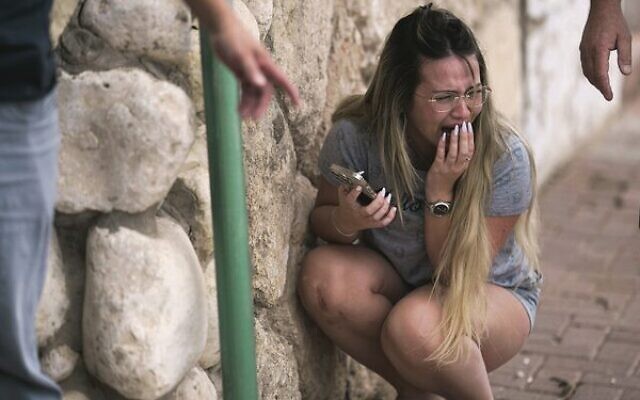A turning point for Israel and the Diaspora
Hamas seeks to destroy Israel by creating a Muslim caliphate 'from the river to the sea'. They are a main impediment to the creation of a Palestinian state

This war feels different. Not only because on October 7 Hamas savagely killed more Jews than on any day since the Holocaust. Not only because Hamas acted with such inhumanity – decapitating, raping, burning families and executing children. Not only because the pain is ongoing as the hostages live an unimaginable trauma, and Israelis live under threat of rocket attacks. As we grapple with our collective grief, it feels as though we are at a turning point both in Israel and in the Diaspora.
For Israel this war feels existential, as Israel’s Prime Minister Benjamin Netanyahu said on October 29 in announcing an expanded ground operation, the troops “are determined to eradicate this evil from the world, for our existence and, I add – for all of humanity”. Adding, the war will be “long and hard, it is our second War of Independence”.
Israel’s military response is a determination to show deterrence not only to Hamas but also its stronger enemies, especially Iran – who funds Hamas, as well as Hezbollah in Lebanon and the Assad regime in Syria. While Israel is already engaged in skirmishes with Hezbollah in response to their rocket attacks, it is feared Hezbollah has over 150,000 rockets and missiles which could overwhelm Israel’s Iron Dome defence system. If this occurred, Israel could respond by directly targeting Iran, which is widely believed to be on the brink of obtaining nuclear weapons. That is perhaps why the US has demonstrated “rock solid” support to Israel and it understands it needs to deter Iran from escalating its involvement.
Netanyahu said the goals of Israel’s ground offensive were to “destroy Hamas’ governing and military capabilities and to bring the hostages home.”
The early initial support for Israel in the face of the atrocity has given way to international calls for a ceasefire. But calls for a ceasefire are not calls for peace, as it would retain the status quo. This would result in Hamas planning further attacks on Israeli civilians, and would enable Hamas to continue its control of Gaza which has brought devastation to Palestinians.
Calls for peace would be for Hamas to renounce violence and release the hostages.
But if Hamas’ ability to govern the Gaza Strip is removed, what comes next? Could a weak and corrupted Palestinian Authority be installed? Would an international force administer the Strip? The end game is not yet clear. And will a ground operation help or hinder efforts to release the hostages? Many analysts believe the best hope for their release is to pressure Qatar which hosts Hamas leaders. However, the ability of a ground operation to secure hostages was shown on October 30 when captured Israeli soldier Ori Megidish was rescued by the Israeli army.
In the Diaspora it also feels different. It is as though the massacre lifted the mask of those who genuinely care about peace, and those who are antisemitic. Incidents of antisemitism have increased around the world, especially at universities – at Cornell University, online posts included threats to shoot Jewish students and encouragement to others to kill them.
We are concerned for the safety of our Jewish communities. We have also seen the media’s misreporting and the spread of misinformation. We have seen posters of the kidnapped defaced with words like “actors” and “fake news”.
While we have appreciated support from our non-Jewish friends, we also heard silence and justifications for the massacre by many on the left. Israeli historian Yuval Noah Harari joined 90 signatories to a statement on October 16 expressing dismay with “elements of the global left” who had “justified Hamas’ actions”. The letter said: “We never imagined that individuals on the left, advocates of equality, freedom, justice, and welfare, would reveal such extreme moral insensitivity and political recklessness.” Similarly, Jewish women have expressed hurt by the silence of feminist organisations including UN Women to explicitly condemn Hamas. On October 23 an open letter signed by dozens of women’s groups from Israel and around the world stated: “It is unthinkable that a UN agency responsible for women’s rights ignores the abduction of women, babies, girls, children and men from their homes, committing war crimes against women and children, and the murder of over a thousand innocent civilians.”
Many of those sympathetic to the Palestinians ignore that Hamas is not interested in a Palestinian state in the West Bank, the Gaza Strip and East Jerusalem. Rather Hamas seeks to destroy Israel by creating a Muslim caliphate “from the river to the sea”. They are a main impediment to the creation of a Palestinian state.
The Palestinians in Gaza have been held hostage by Hamas since it took over the Strip in 2007. Now the terror group has tragically brought mass conflict to Gaza creating a humanitarian crisis. As the letter from six former Australian prime ministers said, “Hamas terrorists have no more interest in the safety of Palestinians than they do of Israelis.”
This war feels different because it goes to the heart of Israel’s raison d’etre – to protect Jewish lives in our ancestral homeland. It feels different because as Jews we have seen who supports us and who does not, who calls for the release of hostages and who does not, and for whom Jewish lives matter, and for whom they do not, and we will remember it all.
As is being said, “Never again, is now.”
Sharyn Kolieb is the deputy editor of The AJN.

comments